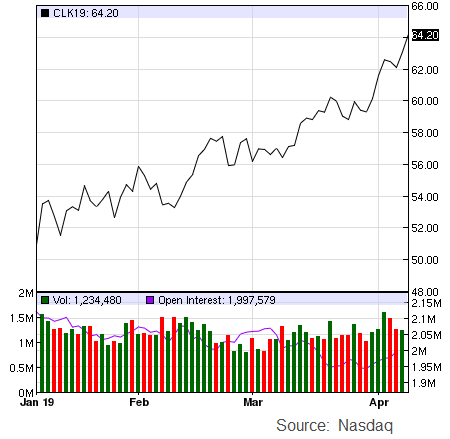Gas Prices Will Not Lower Any Time Soon – Here Is Why
April 08, 2019
A series of events has led to what many would consider a sharp rise in gasoline prices at the pump over the past few weeks.
There has been an 18% increase in gas prices from December 2018 to April 2019. Anytime we experience a rise that significant in the price of any commodity, it is going to be noticed by consumers.
Wally Tyner, agricultural economist at Purdue University, studies fuel prices as well as energy issues and stated, “The issue of an average gas price is mostly supply and demand.”
He said three issues came together at the same time to create the increase in prices at the pump, most notably an increase in crude oil prices driven by the Organization of Petroleum Exporting Countries. The issue of prices varying from one city to the next is either a matter of competition or unexplained.
“OPEC meets periodically and they set quotas and sometimes they respect quotas and sometimes they don’t,” he said. “This time, Russia and Saudi Arabia who are the two key players respected their quotas and if they do the market is going to go up.”
“Crude has gone up $10 a barrel in the last two weeks. Every dollar that crude oil goes up, gas at the pump goes up 2 1/2 cents,” he explained. “That $10 is already 25 cents. In fact, crude has gone up more than $10 since the beginning of February.”
“Then we’re in the process of switching from winter gas to summer gas,” Tyner pointed out. “Refineries aren’t producing as much gas because they have to give management in switching operations to produce summer gas, which is less volatile, it evaporates less than winter gas. If they’re not producing as much, that means there is less out there, that means there is less supply and the price goes up.”
The cost of producing summer gas is more than to produce winter gas, about a dime a gallon difference, so there is another 10 cents to the price, he noted.
An issue with the switch is that all refineries make that switch at the same time.
“The law requires there cannot be any winter blend in the pumps come May 1 so that means to be sure they really try to comply by April 15,” Tyner said.
The price usually does not come down once the switch is made and refineries are running summer blend at capacity because it just costs more to produce.
As far as issue of price variability between cities, Tyner said usually that is competition based on the number of outlets per capita.
Unfortunately, our salaries do not increase with commodity price increases. Before we go, here are some suggestions to save money.
A. Shop best rates before your next fill-up:
- GasBuddy.com
- GasPriceWatch.com
- Maps.Google.com Then enter “fuel stations” in the “Search Google Maps” search bar.
B. Consider using a loyalty program, warehouse club or gasoline credit cards that offer discounts at the pump.
C. Are you competing in NASCAR? Probably not. Then, slow down. Driving too fast or starting your vehicle and driving off abruptly cause significant fuel economy losses.
